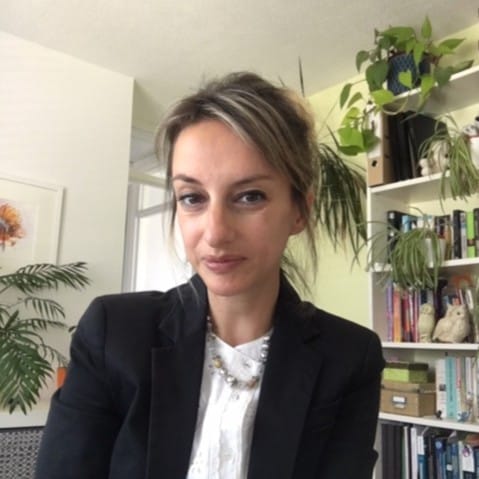In Conversation: Dr Patricia Shamai
For this edition of our 'In Conversation' segment, we had the privilege of speaking with Dr. Patricia Shamai, who shared her unconventional journey into academia and her critical reflections on the impact of emerging technologies.

Dr. Patricia Shamai is a Principal Lecturer in International Relations and Associate Head (Students) of SASHPL at the University of Portsmouth. Her research expertise lies in the fields of international security, deterrence, nuclear non-proliferation, and arms control, with a particular focus on norms associated with weapons of mass destruction (WMD) and the conceptualisation of deterrence in the 21st century. She has addressed issues related to US and UK national security and foreign policy, with a specific interest in nuclear, chemical, and biological weapons non-proliferation. Dr. Shamai has written, presented, and advised both domestic and international media outlets on her areas of research. She also has extensive experience in course development, external examining, academic management, and teaching at both undergraduate and postgraduate levels. In addition, she plays a key role in senior academic leadership, strategic planning, and institutional management.
What was your path to where you are now?
My path was unconventional. I never wanted to be academic; I wanted to get out into the world and make a difference. I always loved world affairs and strategic studies. I completed a master's and got a job at an NGO. I was an intern, and while my experience was great, I found I was reacting to policy. I wanted to understand the policy and contribute to it. A chance meeting with my dissertation supervisor led me into the path of academia.
What are you currently working on?
I am looking at new ways of understanding deterrence strategy and stigma today.
What initially drew you to the study of WMD norms and arms control, and what got you into your field of study in the first place?
Again, this was accidental. I loved world affairs and the interaction between states. The more I studied, the more interested I became in the significance of nuclear weapons and WMD. I wanted to know how and why they stood out as distinct. And I think watching the Gulf War made me realise how dreadful war could be, which led me to look at strategy. Then came 9/11, which served as a wake-up call and reinforced my desire to pursue my interests.
You’ve addressed the evolution of deterrence in the 21st century—how are emerging technologies like cyber tools and drones reshaping traditional deterrence theories?
I think it is almost too early to know. Certainly, they have revolutionised how we view modern conflict. The possibilities of both being used as tools of conflict are appalling. I think we need to adopt our thinking about deterrence. When I say we I mean the policy community. Deterrence cannot go beyond dimensional. It has brought a range of tools and a range of actors. AI and cyber technologies highlight this.
Why have weapons like nuclear and chemical arms attracted strong legal and normative prohibitions, while others, such as autonomous or cyber/AI capabilities, remain largely unregulated?
I have argued that these weapons are stigmatised. This is due to the moral abhorrence associated with their use and their strategic effects. The world has witnessed the devastating effects of the use of these weapons (chemical and nuclear). We have not yet seen the effects of a massive cyber attack. Let’s hope to goodness we do not. For now, the stigma has led to legal constraints and a normative prohibition. This is a changing process and requires continuous international pressure to maintain it.
Looking ahead, are there specific technologies that you feel are under-discussed or under-researched within the arms control community?
That’s a tricky question. I think we come back to our unknown unknowns.. We don’t know what we don’t know, what we can do if we try to learn from the past and maintain the legal and moral standards that history has fought so hard for.
If you could influence one international policy change related to emerging military technology today, what would it be and why?
I’m not sure if it’s a change. It’s an awareness that these weapons are not predictable and not confined to a particular type of actor. I would wish for more international attention and regulations to limit the conditions of use of these technologies.
What do you think can be done for more responsible use and governance of emerging military technology in the future?
I think it requires international collaboration. Efforts need to be made to try to encourage cooperation and dialogue. The alternative to this is conflict, as we have seen over the past few years.
What advice would you like to give PhD students and early career starters that you wish someone had said to you?
Don’t give up on your ideas even if they go against mainstream conventional views. Have patience and faith in your research and ideas, and persevere!
A big thank you to Dr. Patricia Shamai for sharing her insight with us!
Follow and connect with her on LinkedIn
